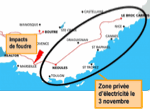On Monday, November 3, the departments of Var and Alpes Maritimes experienced a significant power outage. The violent storms that began in the early morning were the cause of this failure. At 9:40 a.m., the main 400,000-volt artery supplying electricity to the PACA region and connecting Marseille to Nice went offline. The interruption of this line caused a power outage affecting 1.5 million customers.
The reason for this outage
A single 400,000-volt line meets the majority of the regional electrical needs. It constitutes the main artery of very high tension transport in the region. Starting from the electrical station in Tavel, near Avignon, it serves all the major regional agglomerations: Aix, Marseille, Toulon, St Raphaël, Cannes, up to Nice. This dependency is even more pronounced in the east of the Provence-Alpes-Côte d’Azur region (Var and Alpes-Maritimes), which depends 90% on the electricity carried by the transmission network.
In cases of very high consumption or major incidents (fire under the line, violent storm, or equipment failure) like last Monday, the region is exposed to risks of outage. This risk of power cuts is significant throughout the PACA region and even more so in the east of the region, in case of a serious failure on the very high voltage line serving the Bouches-du-Rhône, Var, and Alpes-Maritimes in succession. The Réseau de Transport Electrique (RTE) does not have an alternative route for electricity. The region is therefore more particularly exposed to the risk of large-scale power cuts compared to other regions in France.
The Boutre-Carros high tension line project
The very high tension line project between the electrical stations of Boutre (Manosque) and Broc Carros (Nice) aimed to complete the regional electrical network. The project was defined after a major public debate. Instead of traversing a new site, the new line was to replace two existing lower voltage lines which run in parallel through the Verdon Regional Natural Park. In 2006, the Council of State annulled the public utility declaration granted by the State for this project. It found that the overlap of numerous existing environmental protections on the proposed route opposed the realization of the new line, even though two existing lines would be simultaneously removed.
Nonetheless, the Council of State did not dispute the fragility of the regional electrical supply situation. In accordance with its public service mission, RTE continues to seek solutions for strengthening the very high tension regional network.
The return of the electricity supply issue to the forefront
Following Monday’s outage, the Deputy Mayor of Nice and President of the General Council, Christian Estrosi, expressed anger. He wants to see the energy isolation of the Alpes-Maritimes end as soon as possible.
“The people who took the responsibility of canceling this vital project for the Alpes-Maritimes department carry a great responsibility in this situation. We cannot play with people’s lives with impunity as some ecological apprentices have done, and as those who supported them have done. Today, we must act and act quickly.”
That day, he even spoke with the Minister of Ecology, Energy, Sustainable Development, and Territorial Planning, asking him to initiate urgent procedures to put an end to this situation “by all means.”
Today, in a statement from the Nice City Hall, it was announced that a meeting chaired by Jean-Louis Borloo about the electricity supply in the south of France will take place on Wednesday, November 26, 2008, in Paris.
This will bring together Mr. Hubert Falco, Secretary of State for Territorial Planning, Dominique Maillard, President of the Réseau de Transport Electrique (RTE), Horace Lanfranchi, President of the General Council of Var, Jacques Laisne, Prefect of Var, Michel Sappin, Prefect of Bouches-du-Rhône, and Francis Lamy, Prefect of Alpes-Maritimes.


